ELF bar won the International Manufacturing Award!
According to news on July 9, the 2023 International Intelligent Manufacturing Festival and Hard Technology Summit with the theme of “Technology-Driven, Intelligent Manufacturing of the Future” was recently held in Beijing, bringing together more than 800 people of insight, experts, scholars, and industry in intelligent manufacturing from all over the world. Elites share cutting-edge views, and more than 200 global leading brands of smart manufacturing gather at the Smart Manufacturing Festival to showcase their innovative achievements.
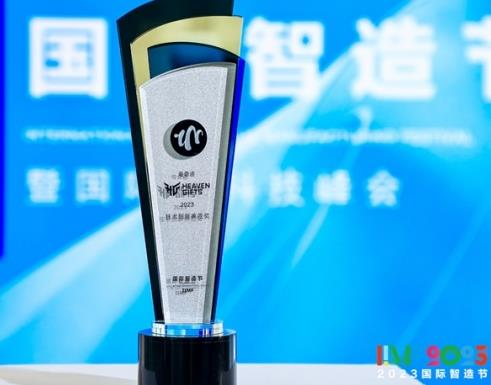
At the meeting, a number of companies represented by Ai Miracle (Shenzhen) Technology Co., Ltd. (“Ai Miracle”) won special awards for enterprises in the 2023 International Intelligent Manufacturing Festival, including technological innovation and green manufacturing awards. In the field of atomizing core technology, Amiracle’s QUAQ NEO technology breaks the conventional etching process for manufacturing atomizing cores. Through the independently developed patented exposure and development technology, it increases the precision of the atomizing core, fines the smoke, increases the degree of taste reduction, and continues to explore for users. The perceivable high-quality product experience empowers the product brand. Ai Miracle is a leading e-cigarette company located in Shenzhen, and it is also one of the e-cigarette companies that are pioneering in green transformation and development.
Two Tobacco Giants Enter Korean Electronic Cigarettes!
According to news on July 9, recently, British American Tobacco intends to enter the Korean atomized electronic cigarette market, and Korean media said that Philip Morris International is also interested.
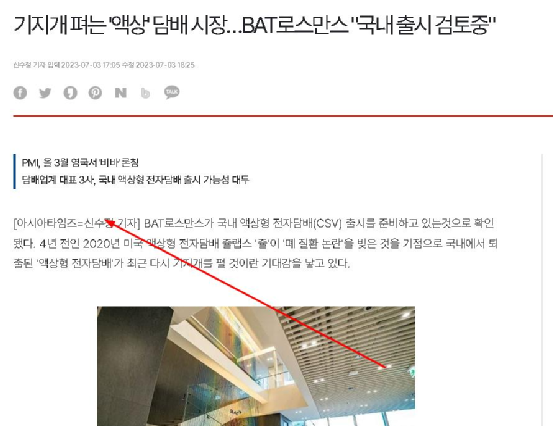
According to South Korea’s “Asia Times” report, British American Tobacco (BAT) plans to launch atomized electronic cigarettes (CSV) in South Korea (Korean electronic cigarettes generally refer to “heat-not-burn products”) to meet market demand. BAT officials said that although there is no clear timetable, they have been actively preparing to launch vapes in the Korean market, and they are conducting internal evaluations to be ready to enter the market at any time. The person also explained that atomized electronic cigarettes are very popular overseas, and the market size is expected to be larger than it is now. Since BAT has products sold abroad, it is deciding whether to introduce them to the Korean market. “Asia Times” believes that although Philip Morris International (PMI) has not specifically considered plans to re-launch vaping e-cigarettes, they have recently launched vaping products overseas and have shown signs of considering the Korean market. PMI launched the disposable atomized electronic cigarette “VEEBA” in the UK in March this year. According to 2020 data, the adult smoking rate in South Korea is 34.0%. Among them, the smoking rate of atomized electronic cigarettes is about 3.2%, accounting for about 10% of the total smoking rate. Compared with 8 years ago in 2013, the proportion of vaping has increased by nearly 5 times. At that time, vaping only accounted for about 2% of the total smoking rate. The adult smoking rate has dropped from 66.3% in 1998 to less than half at present, showing a continuous downward trend. In 2022, the adult smoking rate will reach 31.3%, a record low. The traditional cigarette market is expected to continue its continuous decline.
More than 200 e-cigarette manufacturers in the United States have been issued warning letters!
News on July 9, the US FDA recently issued a report stating that, as I have mentioned many times in the past, CTP will not stand idly by and watch manufacturers, retailers or distributors sell illegal products, especially those that are known to attract Products for young people. From January 2021 to June 2023, CTP issued more than 570 warning letters and took multiple enforcement actions, including filing 13 civil monetary penalties and passing the Department of Justice (DOJ) investigation into the sale of illegal vaping products. The company filed six injunctions. Over the past few weeks, the center has moved quickly to limit the sale of illegal disposable vaping products that appeal to young people. The actions include warning letters to two companies responsible for the manufacture, distribution and importation of Esco Bars and Breeze products, as well as warning letters to more than 200 retailers illegally selling various types of Puff, Hyde, Elf Bar and Esco Bars products . All of these actions are part of the Center’s ongoing compliance and enforcement portfolio, demonstrating our commitment to resolutely enforcing the law throughout our supply chain – from manufacturers to retailers.
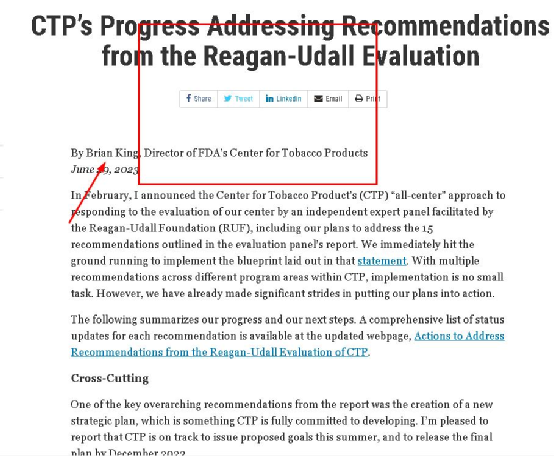
It also noted that the Center has made significant progress in reviewing more than 26 million applications for tobacco products in the past three years, completing the review of 99 percent of applications. As part of these reviews, CTP has approved 23 tobacco-flavored vaping products and devices, and these are currently the only vaping products that can be legally sold or distributed.
E-cigarette tax increases in Louisiana, USA, products must be registered!
According to news on July 9, the state of Louisiana recently passed a new law (Bill No. 414), which stipulates that from July 1, the excise tax on e-cigarette oil will be raised from 5 cents to 15 cents.

Retailers who purchase these products tax-free directly from authorized online manufacturers are required to pay excise tax to the Louisiana Department of Revenue on a monthly basis. Fines, penalties and license confiscation will be strictly enforced for wholesalers and retailers who fail to pay taxes on time. Stores that sell vaping products should expect increased inspections by law enforcement officers. Beginning October 1, 2023, every manufacturer of vaping products and nicotine replacement products that sells products in Louisiana (whether directly or through a wholesaler, retailer, or similar intermediary) must The Anna Alcohol and Tobacco Control (ATC) registers each product. A catalog of vaping products and alternative nicotine products will be available on the ATC website by 1 November 2023.
Norway’s health ministry proposes ban on flavored e-cigarettes
According to news on July 9, the Norwegian Ministry of Health has submitted an e-cigarette regulation bill due to the increase in the number of young people in the EU who use e-cigarettes.
The bill includes: prohibiting the addition of flavors other than tobacco flavors to e-cigarette liquids. The proposal builds on similar principles already in place in countries such as Finland and Denmark. Requires standard packaging for e-cigarettes and similar products. The proposal is based on Denmark and the Netherlands

Similar regulations have been implemented in other countries. In addition, the Ministry of Health is proposing minor changes to the law, such as a clear ban on smoking restrictions to accommodate the many new types of tobacco products appearing on the market, a clear ban on the visible display of tobacco products, and the introduction of consistency to ensure consistency in existing regulations. . The government had tabled the bill on June 9. It will be considered by the parliamentary committee on health and the revised regulations will come into force once passed by parliament.
E-cigarette users in Bangkok, Thailand rank first in the country
According to news on July 9, a nationwide survey conducted by the Department of Health Services Support (DHSS) in Thailand recently found that about 9.1% of young Thais use e-cigarettes, which has caused serious concern for public health officials
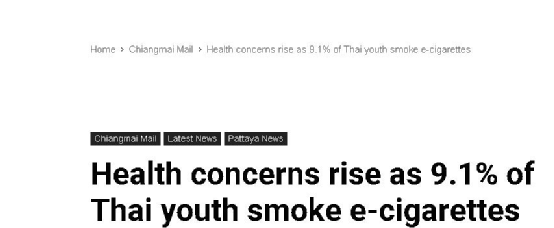 .
.
The investigators collected responses from more than 60,000 respondents between April 25 and June 6, 2023. The results showed that 14.6% of young people in Bangkok use e-cigarettes, ranking first in the country. The survey found that 92.2% of the interviewed teenagers started using e-cigarettes because they were influenced by their friends. Meanwhile, 3.2% said a family member introduced their use of e-cigarettes, and 1.6% mentioned being guided by family members. In addition, 43.9% admitted to using both cigarettes and e-cigarettes. Thailand currently bans the use of e-cigarettes, but domestic organizations opposing the e-cigarette ban hope that the new Thai government will take new actions after the election in 2023 to learn from international experience and scientific evidence. In scientific theory, this will help reduce the negative impact on smokers and protect minors from vaping products.
KT&G foundry can mass produce 300 million pods?
According to the news on July 9, the relevant person in charge of ITM, the Korean foundry of KT&G, said that the company has prepared facilities for the annual production of 300 million pods to ensure high output and a competitive cost structure.
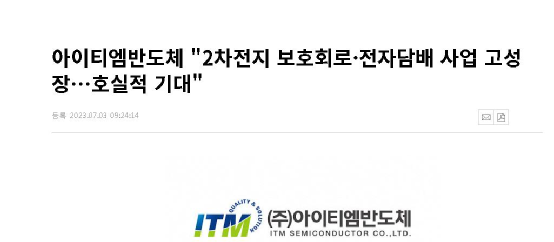
According to the Korean media Newsis, Na Hyuk-Hwi, CEO of ITM, the foundry of the Korean company KT&G, said that ITM is expected to achieve good performance in the second half of the year, as both the protection circuit and e-cigarette sectors have shown stable recovery and growth momentum. According to reports, ITM established the e-cigarette business department last year, produced two types of products for KT&G, “Lil Hybrid Easy” and “Liquid Cartridge for Hybrid”, and plans to expand its export volume this year. The relevant person in charge of ITM said that the company has prepared a facility to produce 300 million pods per year to ensure high output and a competitive cost structure. According to previous reports, ITM began mass production of pods used in KT&G’s hybrid e-cigarette model in February last year, and then began supplying new e-cigarette products in April of the same year, and the sales of the department continued to grow. In response to the continued growth of the global e-cigarette market, the company has completed equipment expansion at domestic and Vietnam factories and plans to make additional equipment investments.
ELFBAR won the forefront of the Russian compliance market again!
According to news on July 9, Fedadov, Russia’s first tobacco consulting company, recently held a sharing session on the theme of “Digital” (ЦИФРЫ) at the Moscow Digital Business Center. The on-site consulting company released the top ten brands of disposable e-cigarettes in the Russian compliance market, including ELFBAR, NOQO, and HQD,MKGvape.
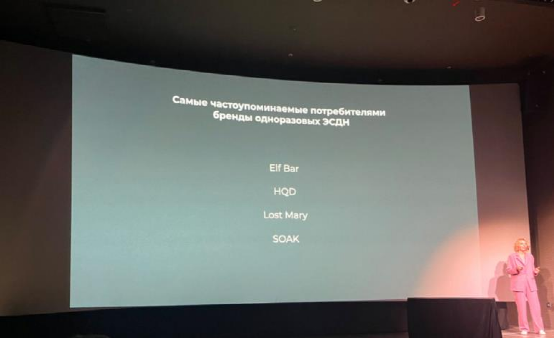
According to reports, there are currently a total of 1,025,000 retail stores throughout Russia, of which 308,000 sell tobacco products, accounting for about 33%. Calculated according to retail prices, the market size of disposable electronic cigarettes is as high as 180-200 billion rubles, the market size of e-liquid is 45-50 billion rubles, and the market size of heat-not-burn products is 200-220 billion rubles. Fedadov shared the top 10 brands of disposable e-cigarettes in Russia’s legal market. The following is the list of brands (in no particular order): ELFBAR, NOQO, OXIDE, HQD, PONS, XPIPE, PLONQ, YA MILANO, IGNITE, LOST MARY. In addition, Fedadov also shared the most frequently mentioned disposable e-cigarette brands by consumers, including ELFBAR, HQD, LOST MARY, SOAK.
Let go of e-cigarettes, historically sue the Malay Minister of Health!
News on July 9th, is it a long journey to legalize e-cigarettes in Malaysia? Anti-tobacco and children’s rights advocates in Malaysia have taken legal action against Health Minister Dr Zaliha Mustafa and the government in recent days over the removal of the nicotine substance from the Poisons Act. This is the first of its kind in public health and anti-tobacco litigation in Malaysia.
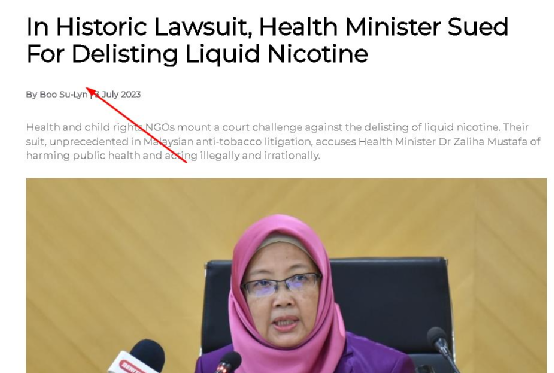
In June this year, more than 40 organizations including the Malaysian Council for Tobacco Control (MCTC), the Malaysian Green Lung Association (MGLA) and the Voice of the Children (VoC) were brought before the Supreme Court. An application for judicial review was lodged, seeking a court order to set aside a decree issued by the Health Minister on March 31 this year which removed liquid and gel nicotine from the list of Poisons Act 1952. It is reported that the High Court will hear the case on July 26. The current Minister of Health, Zaliha, is the first female Minister of Health in Malaysian history. She will be appointed as a cabinet member by Prime Minister Anwar in December 2022. The legal action by civil society marks a sharp escalation in the medical and anti-tobacco community’s opposition to lifting the ban on liquid nicotine, fueled by the government’s failure to secure passage of the Tobacco Bill 2023 at the last Pakatan Harapan meeting .
Vietnam Customs imposes 50% preferential tax on imported e-cigarettes!
On July 9th, Vietnamese e-cigarettes actually “reduced taxes”, which means legal? According to Vietnam’s “Enterprise Finance” report, the General Administration of Vietnam Customs has issued documents to the provincial and municipal customs to guide the implementation of Decree No. 26/2023/ND-CP and No. 15/2023/QD-TTg on export tariffs. A 50% preferential import tax (including electronic cigarettes) will be levied on other nicotine products containing tobacco leaves, restructured tobacco, nicotine or substitute tobacco leaves or nicotine substitute raw materials for inhalation without burning, and other nicotine products used to inject nicotine into the human body.
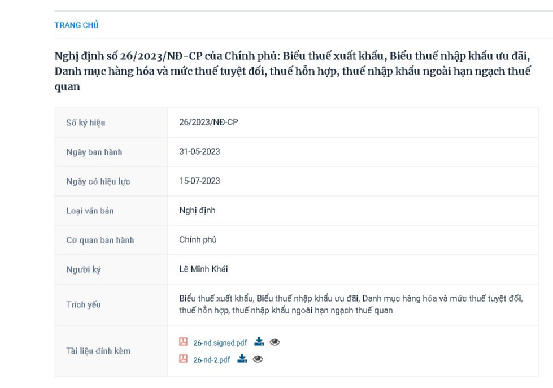
It is reported that Decree No. 26/2023/ND-CP will come into force on July 15, 2023. According to the catalog of taxable commodities stipulated in Annex II of Decree No. 26/2023/ND-CP issued by the Vietnamese government, these commodities include Other nicotine products containing tobacco leaves, reconstituted tobacco, nicotine or tobacco substitutes or nicotine substitute raw materials intended for inhalation without burning, used to inject nicotine into the body. ” (which includes e-cigarette products).
Russia’s 2022 e-cigarette import tax will be three times that of heated tobacco!
News on July 9, according to recent data, in 2022, the total import tax on electronic cigarette equipment in Russia will reach 2.83 billion rubles, and the import tax on electronic cigarette oil will be 3.507 billion rubles; while heated tobacco equipment will reach 357 million rubles, and heated tobacco pods will reach 923 million rubles. billion rubles.
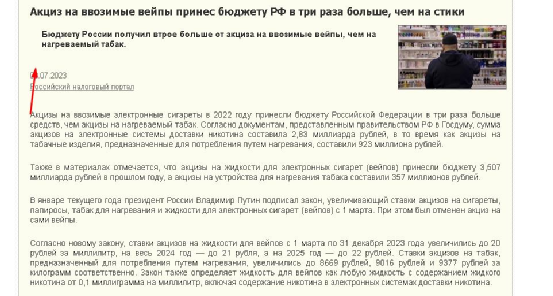
In January 2023, Russian President Vladimir Putin signed a law that increased taxes on cigarettes, cigars, heated tobacco products and e-liquids from March 1, while removing taxes on e-cigarettes themselves. tax. According to the new law, from March 1 to December 31, 2023, the tax rate of e-cigarette oil will increase to 20 rubles per milliliter, 21 rubles per milliliter in 2024, and 22 rubles per milliliter in 2025; 2023 , The tax rate for heated tobacco pods is 8669 rubles per kilogram, the tax will increase to 9016 rubles in 2024, and the tax will increase to 9377 rubles in 2025. The law also defines e-liquid as any liquid containing 0.1 mg/mL or more of liquid nicotine.
KT&G added two sets of heat-not-burn production facilities in the Korean factory!
According to news on July 9, KT&G has added two new heat-not-burn production facilities at the Sintanjin Factory (KT&G Korea Factory), and there are currently seven in total. According to reports, KT&G plans to gradually increase the number of heat-not-burn factories, which is expected to increase to 10 next year. After the expansion is completed, the production capacity of the Xintanjin factory is expected to reach 10 billion heat-not-burn pods next year. With the expansion of production scale, KT&G also built an automated warehouse that can store 400,000 boxes per year last year.

In addition to adding equipment at the Sintanjin factory, KT&G plans to gradually expand e-cigarette facilities at other domestic manufacturing plants. In addition, KT&G is planning to build a new factory in Kazakhstan by the end of next year in order to cope with the increased export volume in the future. At present, KT&G has exported heat-not-burn and special ejectors to more than 30 countries, and the average annual growth rate of ejector exports has reached 24%. Previously, KT&G stated at the “Future Vision Announcement Ceremony” in January that it will focus on the three core businesses of heat-not-burn, global ordinary tobacco and health functional food, and invest about 4 trillion won in the next five years to achieve 100,000 yuan. million won in sales. Especially in the field of new tobacco, KT&G plans to invest 1.2 trillion won to achieve sales of 2 trillion won by 2027. A KT&G official said, “Even in the face of the global economic downturn, we will continue to actively invest with a mid- to long-term vision.”
Philip Morris International enters Australian pharmacies to sell e-cigarettes!
According to news on July 9, a number of pharmacies have recently signed supply agreements with PMI. Philip Morris said it was working hard to comply with new Australian laws. Currently PMI employs a company to distribute sales and marketing materials to pharmacies, and many pharmacies have signed direct deals
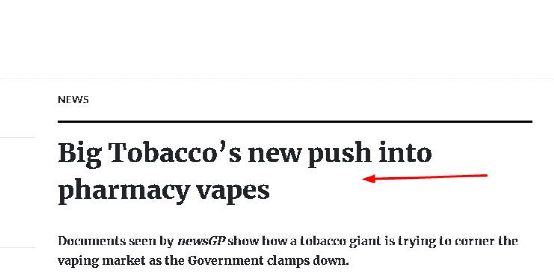
According to a report by the Australian media newsGP on July 5, Philip Morris International (PMI) distributed marketing brochures in Australian pharmacies. The content of the manual shows that VEEV can be used as a tool for smoking cessation, and PMI will provide 80% of the total sales profits of pharmacies that sign supply agreements with it. According to Australian law, the federal government prohibits the country from importing all over-the-counter e-cigarettes and completely bans disposable e-cigarettes, which can only be purchased in pharmacies with a prescription from a general practitioner.
Italy calls for recycling of single-use products!
According to news on July 9, at the meeting of the Italian Tobacco Retailers Federation (Fit), the chairman of the Italian Tobacco Federation Mario Antonelli (Mario Antonelli) gave a comprehensive analysis of the tobacco industry in the 21st century. Antonelli said that Fit supports the government’s ban on remote sales of e-cigarettes, and said that if sellers do not recycle disposable products, they will face administrative penalties, and improper recycling will face criminal penalties.
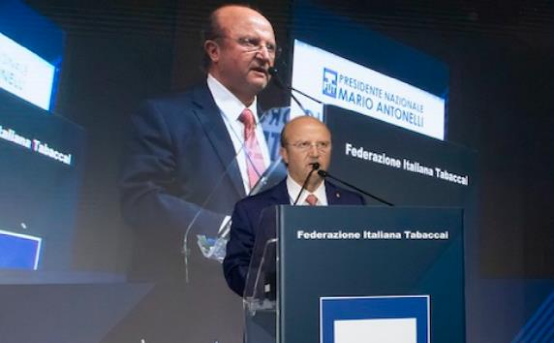
Antonelli also extensively discusses e-cigarettes, a tobacco product that, despite initial skepticism, has grown over the years in its proponents to such an extent that small industry associations that initially supported the spread of e-cigarettes are now joining Got Fit. According to Antonelli, stores specializing in the sale of e-cigarettes are gradually being replaced by tobacco retail outlets. Antonelli believes that the current market is divided into three distribution channels, namely e-cigarette specialty stores, online stores and tobacco retail stores. Despite fierce competition, tobacco retail stores are still the preferred purchase location for about 60% of e-cigarette consumers. He believes retailers need to remain professional and constantly learning and developing the market, while also defending physical sales channels, which are currently being compromised by illegal online online channels. Antonelli also expressed his views on disposable products. He believes that this category has already occupied an important share of the market. He pledged that tobacco retailers with physical sales networks would become recycling points for discarded vaping equipment. He believes that the agreement reached will be in the interest of all. “If you don’t recycle, you will face administrative penalties, and if you don’t recycle properly, you will face criminal penalties.”
The road to approval of medical e-cigarettes is difficult, and it will take up to 10 years!
News on July 9, recently, the Global Forum on Nicotine 2023 (GFN23) was held at the Marriott Hotel in Warsaw, Poland. The theme of this forum was “Tobacco Harm Reduction – The Next Decade”. The forum attracted senior practitioners, scientists and scholars from international tobacco companies, well-known international universities, non-profit organizations and research institutions. As the official cooperative media of GFN23, Two Supremes participated in and reported on the important meeting agenda of the forum.
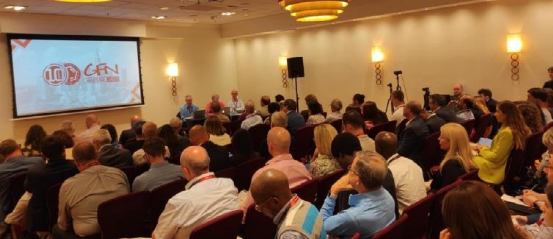
Medical electronic cigarettes are gradually becoming the focus of public attention. However, bringing this innovative product into the medical field required going through a complex and tortuous regulatory process. Mark Dickinson, founder of Clarityse Ltd, a drug marketing consulting company, and Ian Fearon, member of the scientific advisory board of Qnovia, a US venture capital pharmaceutical company and chief scientific officer of McKinney Regulatory Science Advisors, presented to the two Supreme presents developments in this field. And Ian identified Qnovia as a potential pioneer in this field, as the company has remained focused on being the first innovative nicotine replacement therapy in the United States for more than a decade. Its success could provide a blueprint for other companies, paving the way for a robust medical vaping industry. Finally, what cannot be ignored is the prospect of a booming market. It is predicted that by 2028, the market for nicotine replacement therapy products will reach 100 billion US dollars. Potential like this offers a lucrative return on an initial major investment, underscoring the enormous opportunity for those who dare venture into this space.
The Turkish Health Center requires strict enforcement of the ban on the import of e-cigarettes!
According to reports on July 9, Murat Emir, deputy director of the Turkish Center for Health Protection, said that although the country bans the import of e-cigarettes, e-cigarettes are sold on various websites. At the same time, Murat Emir also submitted written questions to the Turkish Grand National Assembly, requiring the Ministry of Commerce to answer.
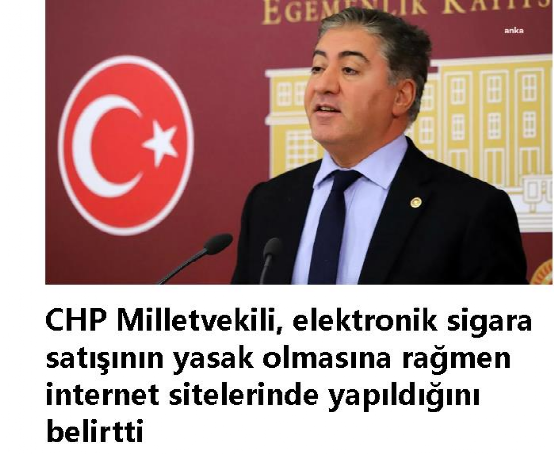
Murat Amir asked, the Ministry of Health and the Ministry of Commerce have clearly ordered e-cigarettes to be “prohibited from entering the country”, but why can e-cigarettes be tolerated on shopping websites that are not sold publicly? Why tolerate advertising and clearance on dozens of websites?
Vietnam is finalizing the legal regulation of e-cigarettes?
On July 9th, according to the “Vietnam Law Daily”, Tran Thanh Trung, a spokesman for the Ministry of Trade of Vietnam, said at a media seminar that various ministries and commissions in Vietnam are holding meetings to finalize the regulation of new tobacco products (including electronic products). Tobacco), which will replace the existing Decree No. 67/2013.

Chen Qingzhong admitted that Vietnam currently has no management policy on new tobacco products (TCM), so such products will not be allowed to circulate. “Most of these products are imported into our country by carrying, smuggling, etc. All commercial and advertising activities are spontaneous and violate the law.” Since there are no management measures and sanctions for new tobacco products, it is very easy to obtain these products. As a result, the Vietnamese government cannot collect taxes, and consumers who want to use them can only buy products from unknown sources. These products that have not undergone quality monitoring have affected their health. Chen Qingzhong said that the Vietnamese government is still evaluating the feasibility of the decree. He believes that the new tobacco product market is still in its infancy, but with the rapid growth in recent years, delaying the enactment of the decree will make the market more difficult to manage.
CBD business soaring?
July 9 news, recently, Ispire announced that the revenue of its CBD atomization equipment business in the fourth quarter of 2023 will exceed the previous forecast of 12 million to 15 million US dollars. The company’s fiscal 2023 fourth quarter and full year ends June 30, 2023.
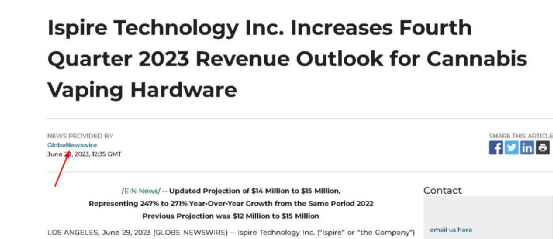
Michael Wang, Chief Financial Officer of Ispire, said, “While we already expected a strong fourth quarter, our CBD vaping device revenue will be at the upper end of our previously expected range, implying very strong growth in the third quarter. We Attribute the success to the market acceptance of our vaping CBD technology, which has facilitated product orders for both medical and recreational use,” said Ispire, which began selling CBD vaping devices in mid-2020. The latest revenue forecast for CBD vaping devices in the fourth quarter of 2023 is $14 million to $15 million, up from the upper end of the previous forecast of $12 million to $15 million. The updated range is up 247% to 271% year-over-year and 84% to 98% sequentially from the fourth quarter of 2022. Additionally, Ispire expects total fourth-quarter revenue of $29 million to $31 million, an increase of 33% to 42% from the fourth quarter of 2022.
Japan Tobacco announced that it will continue to retain its tobacco business in Russia!
According to news on July 9, Masamichi Terabatake, president of Japan Tobacco (JT), made it clear in an interview with Kyodo News that Japan Tobacco (JT) will continue to develop tobacco business in the Russian market.
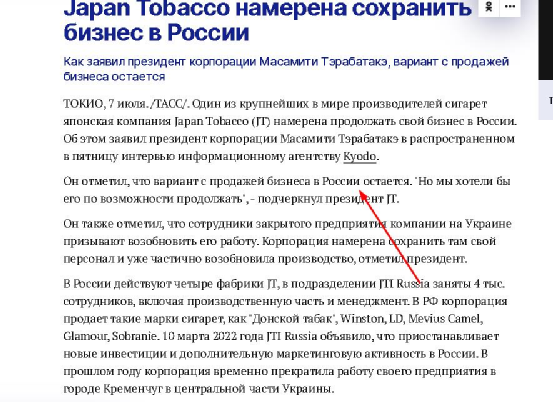
Terabata noted that JT still has a choice as to whether to sell its Russian business. However, they want to continue doing business in the Russian market as much as possible. In addition, Terabatake Masamichi also mentioned that the company intends to continue to retain employees in Ukraine and has begun to partially resume production. In Russia, JT has four factories with a total of 4,000 employees, including production and management personnel. Japan Tobacco’s products are currently sold in 130 countries around the world. It is reported that it entered the Russian cigarette market in 1992, and in the past 20 years, its investment in Russia has exceeded 4.6 billion US dollars.
